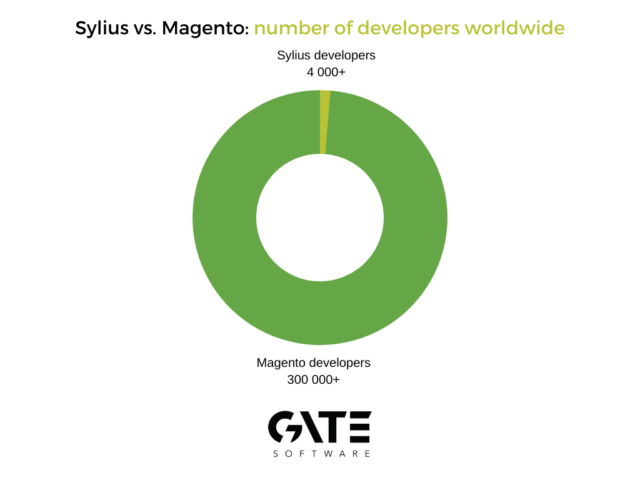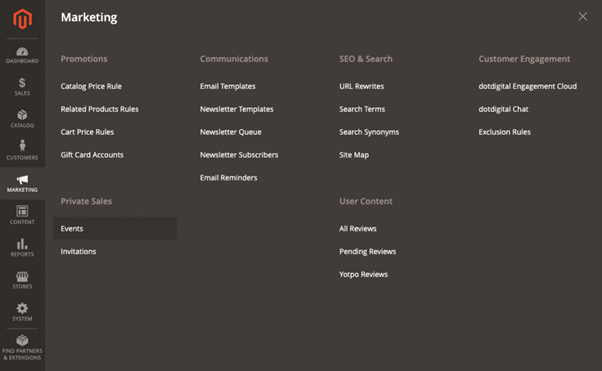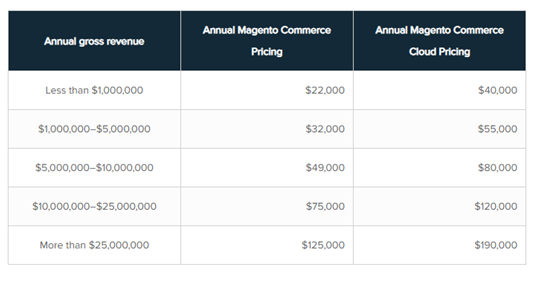The online retail industry is skyrocketing. The pandemic has accelerated the speed of e-commerce development even more, forcing thousands of people to stay at home and choose a safer option for shopping – purchasing online. People in general became more demanding when it comes to the design and functions an online store should have. Layout adjusted to mobile devices, a variety of payment methods, guaranteed safe online shopping – these are only a few examples of “must haves” in every e-shop.
No wonder that the number of online store platforms on the market is also growing. According to G2, there are over 370 e-commerce platforms available for businesses. Magento, PrestaShop, Shopify, Woocommerce, IdoSell belong to the most popular online store platforms, but there are plenty more.
Currently, there are over 370 e-commerce platforms available.
And so, every entrepreneur has to make one very important decision before launching an e-commerce website: which e-commerce platform to choose?
We would like to help you make that decision by providing different comparisons of e-commerce platforms. The following comparison contains technical vocabulary, therefore it is perfect for those familiar with e-commerce tools and development.
If you’d like to read about other platforms, check out the article How to choose the best online store for your business
Sylius vs. Magento — introduction
Sylius is an Open Source Headless eCommerce Platform for mid-market and enterprise brands that need custom solutions. It is based on Symphony (one of the best and most popular PHP frameworks) and REST Api which can be easily customized. Sylius Behavior Driven Development focuses on the business value and not just code. Although the platform has only 2500+ merchants it is rapidly growing. It’s been downloaded over 65 000 times in the last 30 days!

Magento is an open-source eCommerce platform written in PHP and developed on Zend Framework. It is very flexible and customizable – Adobe software provides full control over how the website looks and works. The platform is very scalable and enables multiple integrations (e.g. ERP, PIM), thus, becoming the perfect platform for businesses that want to grow and develop fast. There are over 250 000 Magento online stores in the world, making the platform one of the most popular e-commerce platforms worldwide. And the number is still growing!
Sylius vs. Magento — a detailed comparison
Let’s move on to the detailed comparison of both platforms. There are some similarities as well as differences worth knowing before you decide to choose one.
Sylius vs. Magento — the most important features and different platform versions
At first, let’s take a look at the Sylius platform and its versions available on the market.
- Sylius 1.0 – the first version of the platform released on September 13, 2017.
- Sylius 1.9 – the latest version released on September 14, 2020.
- Sylius Standard – free version of the platform. It contains basic features and an MIT license. This type of a license is a permissive license. It means that you can use the platform and implement functionalities as long as you include the original copyright and license notice in any copy of the e-commerce system.
- Sylius Plus – this advanced version offers SLA-backed support and the so-called enterprise-grade features which include i.a loyalty program, option to create separate admin for each channel or multi-source inventory. Sylius Plus comes along with a commercial license which means that if your company will purchase the plus version, each person within your firm is entitled to use it. Bear in mind that you cannot modify or implement new features on your own but you can propose your solutions to the owner of the platform.
And now, let’s move on to the Magento versions and their brief descriptions:
- Magento Open Source (Magento Community Edition) – this kind of Magento platform is free. You can build an mvp version of your online store with basic features on it.
- Magento Commerce (also called Magento Enterprise Edition) – paid version offering advanced features, tools and architecture. Magento Commerce is a great choice for bigger online stores that want to grow even faster in the future.
- Magento 1 and its updated subversions (e.g. Magento 1.7, 1.8, 1.9) – the first version of the platform officially supported by Adobe until June 2020.
- Magento 2 – the latest version of this e-commerce platform. The last version update (Magento Commerce 2.4.2) took place in February 2021. The new version works faster, contains an improved administration panel, purchase path, mobile support, scales even more easily and provides integrations with external systems such as ERP or PIM.
Sylius vs. Magento — marketing and SEO features
In such a competitive e-commerce market features that will allow you to create effective marketing and advertising for your online store are essential. What does it look like in the case of both compared platforms?
The main difference between Sylius and Magento is that Sylius, unfortunately, does not provide as many marketing functions as the Magento platform.
Sylius Plus allows for creating email campaigns, provides content and reviews management as well as CRM. These features are available only in the advanced, paid version, whereas Magento offers marketing solutions in Open Source Version for free. What is more, Magento allows for up and cross-selling, customizing category landing pages as well as creating coupons and discounts for multiple stores, customer groups, product categories and more.
Below is the Magento marketing dashboard and its additional features:
The biggest disadvantage of the Sylius platform is the lack of SEO management options, both in the Standard and Plus versions. To improve store visibility in search results, you would have to find dedicated SEO extensions for this platform.
Magento, on the other hand, includes advanced SEO features such as: meta description and meta titles for products and categories, enabling site maps, search of terms and synonyms, ability to create 301 redirects and custom URLs. What is important, all SEO features are available in both paid and free versions of Magento.
Sylius vs. Magento — how much does it cost?
As we mentioned in the beginning the standard Sylius version is free of charge and allows building only a simple online store with basic features. As far as the price for Sylius Plus is concerned the platform is selled in Gross Merchandise Volume model. This means you have to contact the Sylius team to find out the price which will be adjusted to the size of your online store. Prices for the Plus version start at €14,900 per year.
If we take into consideration the Magento Open Source version, it is the free, standard version that provides more functions than the minimal version of Sylius. When it comes to the paid version of Magento platform, it is determined by the annual gross revenue of your store. While the on-premise plan of Magento Commerce costs from $22,000 a year, you have to pay from $40,000 annually for the cloud version. You can also negotiate the price with an Adobe representative.
Source: magestore.com
Bear in mind that the above price ranges are only the costs for licence. There are also additional costs e.g. hosting, support, development services etc. While Magento costs are higher, the platform is definitely worth investing in it.
Click here to find out how much a store on Magento costs.
Sylius vs. Magento — scalability
Scalability is the key factor of each e-commerce platform when your online store starts growing and expanding to other markets. It is the ability to keep high performance rates while adding many new items into your store and acquiring more customers. Since this measure is so important, we decided to take a closer look at the scalability parameters of Sylius and Magento.
Sylius scalability rates are impressive. As mentioned in one of the Sylius case studies, the platform can hold 500 simultaneous orders while increasing the productivity rate up to 30%. Sylius is also able to grow the number of unique items in an online store from around 40,000 units, to over 62,000 in less than 6 months from going live.
Although Sylius scalability is one of its strengths, Magento is outperforming it. Magento can hold up to 50,000 visits hourly and numerous products simultaneously thanks to its explicit inventory management.
Below we present the results from performance & scalability test of Magento platform:
Merchant profile
Both scenarios assumed the following Magento store profile:

Small Merchant Deployment ($1-$5M) — orders per hour

Large Merchant Deployment ( $50-$100M) — orders per hour

Source: Magento 2.0 Site Performance and Scalability Optimizations (pdf)
Two Magento versions were taken into account: Magento Enterprise Edition 1.14.2 and Magento Enterprise Edition 2.0. The test was performed in two cases: small merchant deployment and large merchant deployment. As far as the results are concerned the number of orders per hour in Magento 1 does not deviate significantly from the Sylius platform. What is more, the number of orders in the Magento 2 version (both small and large deployment) increased much more in comparison with the results of Sylius. (Bear in mind that the above test results were taken from a store with around 17k products and 200 customers. Unfortunately the details about Sylius online store were not given).
Sylius vs. Magento – speed and performance
The loading time of each online store is crucial for maintaining customers’ attention and ultimately their purchase. The general rule says that the maximum time for a website to load is 3s. If it lasts longer, customers will most likely close the tab with your online store and search for needed products in the e-stores of your competitors.

Source: cloudflare.com
In general, the speed of Sylius in comparison with Magento is better. Its websites load 3 times faster than the Magento ones. However, there are some details that have to be taken into account before you decide on choosing Sylius.
First of all, the speed performance is influenced by many factors such as: the size of images and other files in the store, bad hosting, the number of widgets and plugins, or poor coding standards. As Magento is an advanced and highly customizable e-commerce platform with many features, the longer loading time is optimal here. Besides, there are many proven ways in which you can speed up a Magento store.
What is more, if you can’t perform changes in Magento on your own you can consider hiring an experienced Magento e-commerce agency that will provide support and development services for your store.
Sylius vs. Magento – online store security
To protect your online store from cyberattacks you have to be sure that your store and all the data kept in it are safe. Each e-commerce platform should provide the highest possible security level.
When it comes to this point, both Sylius and Magento have a few things in common.
Sylius mostly relies on security patches. In some particular security issues Sylius also provides solutions that do not require downloading the patches. The latest Sylius security patch release took place in August 2020.
Similarly to Sylius, Magento Open Source also provides security patches. Magento Commerce on the other hand, offers default security features. Additionally, in both versions of Magento, there are some ways to improve security beyond the patches. You can find some of them in this article on our blog.
The patches for Magento 2 are updated regularly – the latest Magento security patch release took place in October 2021. Magento 1, on the other hand, despite the lack of official support, can still be secured by experienced developers.
Which platform is easier to use?
Well, Sylius is definitely the winner here. It is a relatively young platform with basic, not complicated code. It’s ease of use allows you to design a website even when you’re a beginner in the e-commerce industry. Thus, you don’t have to worry about finding the right expert to implement and maintain your store, at least at the beginning of your e-commerce start-up.
Magento on the other hand requires an experienced team of e-commerce experts and developers to support, maintain and develop your online store. As this platform includes complicated code, many additional features and integrations with external systems (e.g. ERP, PIM) it would be best to hire a professional e-commerce agency that specialises in Magento services.
Support services and professional help from experts
Let’s compare one of the basic aspects of e-commerce platforms – support and development for growing your e-business.
The Sylius platform has been on the market for only around 5 years and it hasn’t gained as much popularity as Magento yet. This means that the support capabilities are limited here. Luckily, Sylius provides its own knowledge base in the form of documentation, video instructions, and discussion forums. It is also highly supported by the Symfony community as the platform is based on Symfony. However, the number of Sylius experts is low in comparison to Magento, and the agencies specialising in support of this platform have not emerged yet.

Magento, on the other hand, has its place among the top e-commerce platforms such as Woocommerce, Shopware or BigCommerce. As for 2021 there are around 250 000 Magento online stores and 150 000 trained Magento developers. You can learn from plenty of tutorials available at Magento Help Center or Magento Stack Exchange when using the Magento Open Source edition. In case of any questions or problems you also have access to Magento Forums where you can get help from the community.
Extensions and plugins
The number and types of available plugins and extensions are another integral part of an online store that helps in its development. Thanks to them, you can, among other things, implement new features and improve performance parameters. So, let’s move on to a comparison.
You already know that Sylius is a younger and less advanced e-commerce platform than Magento. It is clear that the number of available extensions and plugins is also smaller. There are around 65 extensions available to download from the Sylius Store. Only 3 of them are not free and you have to pay for them from Є350 – Є2 950. The extensions and plugins will provide you with the basic features needed for running an online store.
When it comes to Magento it has over 4000 extensions and plugins in different divisions. They are grouped in various categories, platform editions (Open Source, Commerce on prem, Commerce on Cloud) and versions (2.4, 2.3, 2.2 and lower). Apart from this, there are 5 themes available at Magento Marketplace. Both extensions and the themes have free and paid versions.
Sylius vs Magento – which platform to choose?
Unfortunately, we cannot give you a clear answer (although we would like to!) because the decision depends on you and your needs. Above, we have provided a detailed description and comparison of the most important features that every e-commerce platform should have. Now it’s your turn to sit down, think deeply, and make a choice. A choice that is best suited to the needs of your business.
(We highly recommend creating a business plan in which you include your milestones, indicating the most important goals to achieve on your way to e-commerce growth and success).
Sylius will be a better choice for beginners who want to launch their first online store on their own, without much experience in the e-commerce industry. It will also be a good choice for small e-shops with a limited budget, in a situation where you do not expect rapid growth in the near future.
Sylius will be a better choice for those without much experience in the e-commerce industry.
Magento, on the other hand, can be suitable for both small, medium and large online stores. However, it requires more experience in developing code or taking help from an experienced agency. The open source edition of Magento would be best for small online stores that want to grow quickly, while Magento Commerce is a good choice for large stores with a large number of products, advanced features, and high motivation for further development.
Want to learn more about Magento, its support and development in your store? Click below
to schedule 15 minutes for a free consultation.
.
.
Zamów bezpłatną konsultację
.
Z nami rozwój Twojego biznesu nabierze tempa! Zapraszamy do kontaktu średnie i duże firmy generujące min. 7 mln PLN obrotu rocznie – tam nasza ekspertyza sprawdza się najlepiej.
.
Kliknij w poniższy przycisk i skontaktuj się z jednym z naszych konsultantów e-commerce
.





